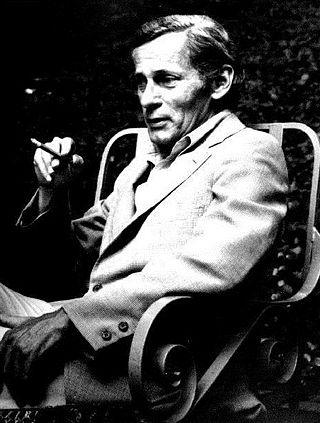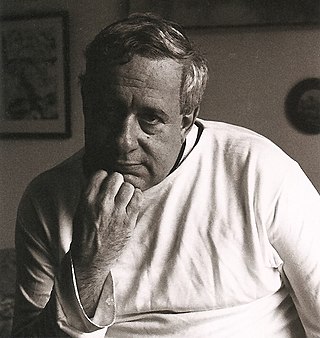Fire the Bastards! was written by Jack Green and published in his magazine newspaper in 1962. [1] It was an acerbic critique of the book reviewing industry.
Green examined the initial 55 reviews that appeared in response to the publication of William Gaddis's 1955 debut novel, The Recognitions . He discovered that some reviewers either did not read or finish the work. Almost half of the reviews contained factual errors. Many employed the same clichés: "too difficult", "too long", "too negative", "ambitious", "a promising first novel." In one case he found that a critic had purloined part of his review from another review.
Fire the Bastards! appeared in book form in 1992. [2] The publishers did not have the permission of the author to print the text. As the work had never been copyrighted, however, it was in the public domain and no permission was required for publication. [3]

William Seward Burroughs II was an American writer and visual artist. He is widely considered a primary figure of the Beat Generation and a major postmodern author who influenced popular culture and literature. Burroughs wrote eighteen novels and novellas, six collections of short stories and four collections of essays, and five books have been published of his interviews and correspondences; he was initially briefly known by the pen name William Lee. He also collaborated on projects and recordings with numerous performers and musicians, made many appearances in films, and created and exhibited thousands of visual artworks, including his celebrated "Shotgun Art".

Jacques Roubaud is a French poet, writer and mathematician.

William Thomas Gaddis Jr. was an American novelist. The first and longest of his five novels, The Recognitions, was named one of TIME magazine's 100 best novels from 1923 to 2005 and two others, J R and A Frolic of His Own, won the annual U.S. National Book Award for Fiction. A collection of his essays was published posthumously as The Rush for Second Place (2002). The Letters of William Gaddis was published by Dalkey Archive Press in February 2013.
Wanda Tinasky, ostensibly a bag lady living under a bridge in the Mendocino County area of Northern California, was the pseudonymous author of a series of playful, comic, and erudite letters sent to the Mendocino Commentary and the Anderson Valley Advertiser between 1983 and 1988. These letters were later collected and published as The Letters of Wanda Tinasky. In them, Tinasky weighs in on a variety of topics—most notably local artists, writers, poets, and politicians—with an irreverent wit and literate polish. The harshness of the attacks was deemed excessive by the Commentary early on, and, as a result, most of the remaining letters appeared in the AVA. At the time, the identity of Tinasky was completely unknown, and was subject to much local speculation. Tinasky was thought by many to be novelist Thomas Pynchon until it was demonstrated that Tinasky was likely an obscure Beat Generation poet named Tom Hawkins.

Brian O'Nolan, his pen name being Flann O'Brien, was an Irish civil service official, novelist, playwright and satirist, who is now considered a major figure in twentieth-century Irish literature. Born in Strabane, County Tyrone, he is regarded as a key figure in modernist and postmodern literature. His English language novels, such as At Swim-Two-Birds and The Third Policeman, were written under the O'Brien pen name. His many satirical columns in The Irish Times and an Irish-language novel, An Béal Bocht, were written under the name Myles na gCopaleen.

Arthur Annesley Ronald Firbank was an innovative English novelist. His eight short novels, partly inspired by the London aesthetes of the 1890s, especially Oscar Wilde, consist largely of dialogue, with references to religion, social-climbing, and sexuality.
Felipe Alfau was a Spanish-born American novelist and poet. Most of his works were written in English.
Dalkey Archive Press is an American publisher of fiction, poetry, foreign translations and literary criticism specializing in the publication or republication of lesser-known, often avant-garde works. The company has offices in Funks Grove, Illinois, in Dublin, and in London. The publisher is named for the novel The Dalkey Archive, by the Irish author Flann O'Brien. It is owned by nonprofit publisher Deep Vellum.

Poor Things: Episodes from the Early Life of Archibald McCandless M.D., Scottish Public Health Officer is a novel by Scottish writer Alasdair Gray, published in 1992. It won the Whitbread Award and the Guardian Fiction Prize the same year.
The Recognitions is the 1955 debut novel of US author William Gaddis. The novel was initially poorly received by critics. After Gaddis won a National Book Award in 1975 for his second novel, J R, his first work gradually received new and belated recognition as a masterpiece of American literature.

Chandler Brossard was an American novelist, writer, editor, and teacher. He wrote or edited a total of 17 books. With a challenging style and outsider characters, Brossard had limited critical success in the United States. His novels were more appreciated in France and Great Britain.
Rikki Ducornet is an American writer, poet, and artist. Her work has been described as “linguistically explosive and socially relevant,” and praised for “deploy[ing] tactics familiar to the historical avant-garde, including an emphasis on gnosticism, cosmology, diablerie, bestiary, eroticism, and revolution, to produce an astounding body of work, cogent and ethical in its beauty and spirit.”

Alan Ansen was an American poet, playwright, and associate of Beat Generation writers. He was a widely read scholar who knew many languages. Ansen grew up on Long Island and was educated at Harvard. He worked as W. H. Auden's secretary and research assistant in 1948–49; he was the main author of the chronological tables in Auden's The Portable Greek Reader and Poets of the English Language.

Mulligan Stew is a postmodern novel by Gilbert Sorrentino. It was first published in 1979 by Grove Press, simultaneously in hardcover and softcover.
Steven Moore is an American author and literary critic. Best known as the primary authority on the novelist William Gaddis, he is the author of the two-volume study The Novel: An Alternative History.

Robert Coleman Dowell was an American writer.

The Tunnel is a 1995 novel by the American author William H. Gass. The novel took 26 years to write and earned him the American Book Award of 1996, and was also a finalist for the PEN/Faulkner award.
jack green is the pseudonym of Christopher Carlisle Reid, an American literary critic who was a great defender of the work of William Gaddis. Reid—who took the name from a racing form after he quit his job to become a freelance critic—particularly admired Gaddis' 1955 novel The Recognitions, which flopped upon being published. Reid believed that the commercial failure of the hardcover edition of Gaddis' novel was the result of it having been panned by literary critics. Reid's faith in Gaddis was borne out when The Recognitions was chosen as one of TIME magazine's 100 best novels from 1923 to 2005.
Locos: A Comedy of Gestures is the first novel of Spanish-born American writer Felipe Alfau (1902–1999), written in 1928 and published in 1936. The metafictional novel remained out of print until 1988 when it was reprinted by Dalkey Archive Press; its positive reception then led to the publication of Alfau's second novel Chromos in 1990, which he had written in 1948.

Ryder (1928) is the first novel by Djuna Barnes. A composite of different literary styles, from lyrical poetry to sentimental fiction, it is an example of a modernist novel in the Rabelaisian tradition of bawdy and parodic fiction. Nearly every chapter is written in a different style. The novel is thought to draw on elements of Barnes's own life.